The Fastest Gaming Mice
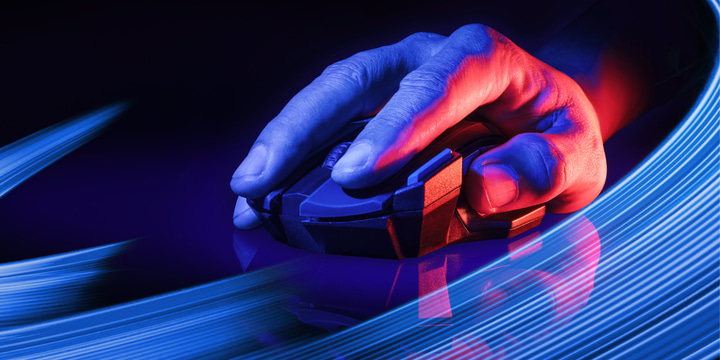
Introduction
Today, gaming mice are at that point where pretty much every single product that gets released by a reputable company is going to have a flawless sensor, and wireless technology is also something that has gone completely mainstream.
Manufacturers have to look at different ways to set their products apart from the competition, and overall latency is one of those ways. With the dawn of 8000Hz gaming mice, a true race towards having the fastest responding mouse has been started, and while it’s true that it gets impossible to notice the difference between the fastest responding mice in actual gaming scenarios, it’s always interesting to see how the top performers stack up.
In this article, we’ll list some of the fastest gaming mice out there right now and briefly go over their features. Do note that we don’t have data on all mice out there. Gaming mice get released almost every single day, and with top tier mouse technology becoming available to more and more manufacturers, it’s only logical that there’s going to be an increase in top performing gaming mice.
Does Latency Matter?
The short answer: yes. A mouse with a high click/motion latency will simply respond too slowly, meaning that the moves that you make on your mousepad won’t be translated to the game in time, making it impossible to perform consistently. For maximum performance, you want your inputs to get registered pretty much instantly. Due to hardware limitations it’s of course impossible to instantly register clicks, but we are getting very close.
As far as latency numbers go: anything under 5ms (so every mouse in this article) is basically considered to be top tier, with <2ms response times being pretty much cutting edge. It’s nearly impossible for a human to see or feel a meaningful difference between mice that fall within the 1ms-10ms range, though. With technology advancing, mice that are way above 10ms are becoming rarer, but you can still comfortably use mice with latencies of up to 15ms. Anything higher than that can become noticeable.
We can conclude that mouse latency does matter, but only to a certain extent. As long as it’s below certain parameters it shouldn’t be a deciding factor when choosing a gaming mouse. Aspects such as shape and comfort are far more important when it comes to choosing a gaming mouse. It is really cool to see that latency optimization is something that’s being looked at across the peripherals market, however.
When it comes to latency, anything under 5ms is basically considered to be top tier, with <2ms response times being pretty much the cutting edge.
NVIDIA Reflex
Brands like NVIDIA have been investing a lot into reducing latency in games for a while now, with platforms such as NVIDIA Reflex allowing users to analyze and optimize the latency of their system. With Reflex, users can not only analyze the latency of their gaming setup (if you have compatible peripherals and components, note that high refresh rate monitors are also a traditional component of a latency-optimized system) but developers can also reduce the overall latency of players by implementing NVIDIA’s Reflex technology into their games.
As a whole, Reflex is exciting technology, and we’re seeing it get introduced to more and more peripherals (as well as more and more games, with Counter-Strike’s upcoming CS2 update also adding Reflex to the world’s most popular shooter game) meaning that the battle against latency is getting fiercer than ever.
Wireless vs Wired
Different companies use different wireless technologies, but as you’re going to see in the article, a mouse like the G Pro X Superlight (which is an older wireless mouse at this point in time) is still playing with the big boys, despite being only 1000Hz and wireless. The days of wireless connections being automatically inferior to wired ones are well and truly over.
8000Hz vs 4000Hz vs 1000Hz
A higher polling rate mouse can (but this isn’t always the case: a lot depends on implementation) lead to higher response times, so mice with a polling rate of 4000 or even 8000Hz are generally going to perform better when it comes to overall latency. It’s logical: an 8000Hz mouse sends eight times as much information per second to the PC than a 1000Hz mouse, so shorter intervals between different ‘mouse status updates’ will generally lead to quicker response times.
ASUS ROG Chakram X
0.2ms (wired, 8KHz)
NVIDIA Reflex Compatible
The ASUS ROG Chakram X is a mouse that’s packed with technology, both on the outside as well as on the inside. It has a flawless 8000Hz sensor (called the AimPoint sensor) and it comes with three ways to connect it to your PC: via Bluetooth, 2.4GHz wireless, and via a wire. It also has optical mouse switches for ultimate responsiveness.
The Chakram X also has a number of unique features. For starters, the main mouse switches are hot-swappable. This is very rare with gaming mice, and it’s an extremely valuable feature if you’re asking us. When gaming mice stop working properly, the culprit is very often a faulty switch, so having the option to just swap out a broken switch with a new one is great. Them being hotswappable also means that you can get rid of the default switches and go for a set of switches that matches your personal preferences should you have a favorite mouse switch.
The Chakram X also has a series of extra input options: it has four side buttons instead of the usual two, and there’s even a programmable joystick on the side of the mouse, which can be used in analog mode (functioning as a console controller joystick) should you want to use it in that way.
To top it all off, it has a battery life of 114 hours and is Qi-compatible. All of these extra features make it rather heavy (127 grams) but if you can live with that and you want a mouse with an absolute ton of extra options and configurable hardware then the Chakram X is a good one to consider.
ASUS ROG Chakram X
The ASUS ROG Chakram X is a mouse that’s packed with extra features and technologies, including a joystick and extra side buttons.
Pros
- Great response time and gaming performance
- Long battery life
- Hot-swap switches are a great idea
- Lots of extra buttons and features
Cons
- Heavy
- Side button placement isn’t optimal
- Rather expensive
Specs
| Sensor | ROG AimPoint |
|---|---|
| Polling Rate | 125 / 500 / 1000 / 4000 / 8000 / 2000 Hz |
| Button Switches | ROG Micro Switches |
| Connection | Wireless |
| Shape | Ergonomic |
| Length | 13.3cm |
| Height | 4.2cm |
| Weight | 128g |
| Width | 7.7cm |
Zaunkeunig M2K
0.3ms (wired, 8KHz)
If the ASUS ROG Chakram X is a Rolls Royce-style mouse that’s focused on comfort and having all of the extra features one could ever want then the Zaunkeunig M2K is a drag racer that’s been stripped to the bare essentials.
There’s not a lot to say about the Zaunkeunig M2K because there isn’t a lot there, quite literally. This mouse is handmade out of carbon fiber and weighs just 24 grams. There are no side buttons and it can only connect via a cable, making this a mouse that’s extremely specialized. Combine that with the fact that it has a shape that pretty much only lends itself to fingertip grip and you have a mouse that’s aimed at a very, very specific segment of the market.
Zaunkoenig M2K
All of the above makes this mouse a very unique product. It’s not for me, but it doesn’t have to be. I respect companies who try things like this. If you are someone who is looking for the lightest mouse you can find and you use a fingertip grip, this has every chance to be your ultimate mouse.
Pros
- Extremely lightweight
- Very responsive feeling
- Flawless sensor performance
- Great coating
Cons
- Buttons feel a little mushy
- Only comes as a wired mouse
- Very expensive
Specs
| Sensor | PMW 3360 |
|---|---|
| DPI | 12000 |
| Polling Rate | 1000 / 2000 / 4000 / 8000 Hz |
| Button Switches | Omron |
| Button Force | 74g |
| Connection | Wired |
| Shape | Ambidextrous |
| Length | 784cm |
| Height | 2.7cm |
| Weight | 24g |
| Width | 5.8cm |
Razer DeathAdder V3 Pro
0.5ms (wireless, 4KHz)
Razer’s revamp of their famous DeathAdder line has been a massive success with gamers, and that’s not only due to the shape change which made the DeathAdder more accessible. Inside the mouse there’s plenty of technology to place the DAV3 (as it’s often called in enthusiast circles) up there with the very best.
The DAV3 Pro comes with Razer’s Focus Pro 30K Optical sensor and the third generation of their Optical switches, and this gives the mouse plenty of speed. If you purchase a separate dongle (sadly this isn’t included with the mouse by default) it’s capable of polling rates of 4000Hz in wireless mode, making it one of the fastest responding gaming mice out there right now.
Razer Deathadder V3 Pro Black
❝The DeathAdder V3 Pro is aimed squarely at competitive and professional gamers who desire performance above all else, and it hits the mark on all fronts.❞
Pros
- Great build quality
- Flawless wireless connection
- Great battery life (90 hours)
- Capable of 4KHz polling rate in wireless mode (with separate dongle)
- Gen 3 optical switches feel great
Cons
- Price is high
- Side buttons have too much post travel
- Shape change might not sit well with everyone
- 4KHz polling rate not achievable out of the box (you need a separate dongle)
Specs
| Sensor | Focus Pro 30K |
|---|---|
| Polling Rate | 125 / 500 / 1000 / 4000 Hz |
| Button Switches | Razer Optical |
| Button Force | 81g |
| Connection | Wireless |
| Shape | Ergonomic |
| Length | 12.95cm |
| Height | 4.21cm |
| Weight | 63g |
| Width | 6.13cm |
Corsair Champion Sabre RGB Pro
0.6ms (wired, 8KHz)
NVIDIA Reflex Compatible
Corsair is a brand that perhaps isn’t very known for their gaming mice, but the Sabre (RGB) Pro proves that they definitely know how to put out top tier gaming pointers. This ergonomic mouse comes in at 74 grams (there’s also the RGB-less version that weighs 69 grams) and houses some top tier components making it one of the most responsive gaming mice out there right now.
What’s particularly great about this mouse is that it can be bought at extremely friendly prices. We’ve seen the mouse go on sale for prices as low as 30 dollars. That’s a bargain for a mouse housing technology such as this, and to top it off it has a rather comfortable ergonomic shape (of course this is subjective, but there are no awkward curves or anything like that to be found) and is built very well.
If you’re on a budget and you’re looking for a top-specced gaming mouse then the Sabre RGB Pro should be high on your list if you’re asking us.
Corsair SABRE RGB Pro
Used by 1 player ()❝Corsair have managed to make a very impressive mouse here. If you’re looking for a lightweight ergonomic mouse then this should definitely be one to consider, even if you don’t want to make use of its higher polling rates. An impressive release.❞
Pros
- Great gaming performance
- Nice clicks
- 8000Hz polling rate
- Good build quality
Cons
- Feet are subpar
- Cable is pretty thick
Specs
| Sensor | PMW 3392 |
|---|---|
| Polling Rate | 125 / 500 / 1000 / 2000 / 4000 / 8000 Hz |
| Button Switches | Omron |
| Button Force | 82g |
| Connection | Wired |
| Shape | Ergonomic |
| Length | 12.2cm |
| Height | 4.2cm |
| Weight | 74g |
| Width | 6.0cm |
Razer Viper 8KHz
0.7ms (wired, 8KHz)
There are a couple of different iterations of the Razer Viper, but if you’re looking for the absolute fastest Viper version then the wired 8KHz version is the one to go for. This was one of the very first gaming mice to come out with an 8KHz polling rate and it was quite the hyped product back when it first released due to this fact.
The Viper 8KHz isn’t a one-trick pony, though. It is a nicely built mouse with pleasant clicks and a rather safe shape, so if you’re looking for an ambidextrous gaming mouse from one of the big brands that’s capable of 8KHz polling rates then this is worth considering.
Razer Viper 8KHz
Used by 5 players ()Even if we leave the whole 8000Hz polling rate thing out of the equation, the Razer Viper 8KHz is a fantastic gaming mouse. It has a safe shape (though be wary of how flat and long it is), great clicks, a flawless sensor, and it’s built nicely, making this a really solid choice for people who are into this kind of shape and like the features.
Pros
- Great gaming performance
- Good build quality
- 8000Hz polling rate
Cons
- Cable is rather thick and rigid
Specs
| Sensor | Focus+ |
|---|---|
| Polling Rate | 1000 / 2000 / 4000 / 8000 Hz |
| Button Switches | Razer Optical |
| Connection | Wired |
| Shape | Ambidextrous |
| Length | 12.7cm |
| Height | 3.8cm |
| Weight | 71g |
| Width | 5.8cm |
EVGA X17
0.7ms (wired, 8KHz)
NVIDIA Reflex Compatible
The EVGA X17 is a mouse that might not ring any bells with the majority of gamers, but it is an impressive piece of tech. It has a triple sensor array with 2 sensors that handle the LOD, allowing you to adjust it very precisely. The other sensor handles the usual stuff and is capable of polling rates of up to 8KHz, making this a very responsive gaming mouse.
The X17 also comes with some extra features, most notably a ‘sniper button’ that lowers the DPI when pressed, giving you more precision when aiming. The scroll wheel also tilts, giving you even more input options. With its thumb rest and higher weight, it firmly nestles itself in that G502/Basilisk category of mice for people who like a comfier, heavier mouse with a thumb rest for gaming.
EVGA X17
The EVGA X17 is a modern iteration of the ergonomic mouse with an attached thumb rest, making it a solid option for people who prefer this type of shape.
Pros
- Good build quality
- Great gaming performance
- Extra scroll wheel inputs
Cons
- Thick and rigid cable
- Heavy
Specs
| Sensor | PMW 3389 |
|---|---|
| Polling Rate | 125 / 250 / 500 / 1000 / 2000 / 4000 / 8000 Hz |
| Button Switches | Omron |
| Connection | Wired |
| Shape | Ergonomic |
| Length | 12.3cm |
| Height | 4.4cm |
| Weight | 103g |
| Width | 2.8cm |
Logitech G Pro X Superlight
0.8ms (wireless, 1KHz)
NVIDIA Reflex Compatible
Logitech knows how to make a gaming mouse. The fact that the flagship G Pro mice (i.e. the G Pro Wireless and the Superlight) have absolutely dominated the professional gaming scene for years now is evidence towards that claim, and there are a ton of reasons for this domination. If you’re interested in the history of this mouse you can always check out our article on it.
Something that’s extremely impressive with Logitech mice is just how well optimized they are. Despite being a mouse that was released years ago, the Superlight still finds itself playing in the top divisions when it comes to performance. It’s a wireless mouse with a polling rate of 1000Hz that was released years ago and yet it’s still among the most responsive gaming mice out there: that’s impressive.
It’s no wonder that professional gamers flocked to this mouse in droves and are very hesitant to switch to more modern alternatives: the Superlight still gives a lot of newer mice a run for its money when it comes to pure performance.
Logitech G Pro X Superlight
Used by 289 players ()If you’re looking for an ultra lightweight wireless mouse with a safe shape this is a top option.
Pros
- Fits most hands and grip styles
- Good battery life
- Flawless wireless performance
- Lightweight
Cons
- Micro USB charging port
- High price
Specs
| Sensor | HERO |
|---|---|
| Polling Rate | 125 / 250 / 500 / 1000 Hz |
| Button Switches | Omron |
| Button Force | 65g |
| Connection | Wireless |
| Shape | Ambidextrous |
| Length | 12.42cm |
| Height | 3.96cm |
| Weight | 62g |
| Width | 6.06cm |
Logitech G303 Shroud Edition
0.8ms (wireless, 1KHz)
NVIDIA Reflex Compatible
Logitech’s wireless implementation (and mouse technology in general) is fantastic and the G303 Shroud Edition is another example of this. This mouse is an updated version of the G303, which was a mouse that gained a bit of a cult following in part due to the fact that streamer (and former Counter-Strike: Global Offensive professional) Shroud used it for years.
This newer version is slightly larger than the old ones, so fans of the old G303 who are looking for a 1:1 shape copy should adjust their expectations, but other than that it’s a fantastic modern version of a beloved cult classic that performs fantastically. Just note that it’s a very specific shape that seems to tailor to a specific style of claw grip, so if you’re looking for a safe shape there are other options to consider.
Logitech G303 Shroud Edition
Used by 1 player ()Aside from its rather unsafe shape, the Logitech G303 Shroud Edition is, as we’ve come to expect from Logitech, a fantastic gaming mouse. It has satisfying buttons, a nice (though rather tactile and on the louder side) scroll wheel, good stock feet, a flawless sensor and wireless connection, and it seems to be built well. All elements are here to make this a fantastic gaming mouse, but do make sure that your hands will agree with this shape before committing to it.
Pros
- Great build quality
- Flawless wireless performance
- Great battery life
- Specialized shape makes it ideal for claw grippers…
Cons
- … but the specialized shape makes it unsuitable for any other grip type
- Omron switches might be considered outdated by some
Specs
| Sensor | HERO |
|---|---|
| Polling Rate | 125 / 250 / 500 / 1000 Hz |
| Button Switches | Omron |
| Button Force | 78g |
| Connection | Wireless |
| Shape | Ambidextrous |
| Length | 11.46cm |
| Height | 3.96cm |
| Weight | 75g |
| Width | 6.85cm |
Endgame Gear XM1r
0.9ms (wired, 1KHz)
German engineering has a great reputation across the globe, and that also extends to the mouse market. Endgame Gear is a relative newcomer but they made some significant waves in the peripherals scene with their XM1 line of mice. The XM1r is currently the top tier wired XM1 mouse, and it’s got a ton going for it.
Under the hood of the mouse you’ll find a fantastically implemented 3370 sensor with Kailh GM 8.0 switches. Those are great specs (especially for the time the mouse was released) but if you combine those with a polling rate of 1000Hz you wouldn’t immediately think ‘ultra fast’. The XM1r is a perfect example of the fact that the implementation of various components can make a world of difference, however.
It’s still one of the most responsive mice out there, and due to the absolutely fantastic build quality and great (claw grip-focused) shape it’s a mouse that’s often recommended in the enthusiast scene. It’s an especially great mouse to consider if you main a claw grip.
Endgame Gear XM1R
Used by 1 player ()This mouse should be near the top of your list if you’re looking for a reliable ambidextrous gaming mouse, and at the very top if you’re using a (predominantly) claw grip.
Pros
- Great shape
- Fantastic build quality
- Great gaming performance
Cons
- Feet aren’t the best
Specs
| Sensor | PMW 3370 |
|---|---|
| Polling Rate | 125 / 500 / 1000 Hz |
| Button Switches | Kailh GM 8.0 |
| Button Force | 71g |
| Connection | Wired |
| Shape | Ambidextrous |
| Length | 12.1cm |
| Height | 3.8cm |
| Weight | 70g |
| Width | 5.9cm |
Roccat Kone Pro Air
1.2ms (wireless, 1KHz)
NVIDIA Reflex Compatible
The Roccat Kone Pro Air is one of the brand’s flagship mice. It comes in at 75 grams and features Titan Optical switches as well as their flawless Owl-Eye 19K DPI sensor.
This comfortable ergonomic mouse connects to your PC through a flawless and lag-free wireless connection, and everything is incredibly well-tuned here, making this one of the most responsive mice on the market. It has a battery life of 100+ hours, can connect through Bluetooth as well as 2.4GHz, and just ten minutes of charging is enough to give you 5 hours of gaming time.
This is Roccat’s take on a top tier gaming mouse that’s designed for competitive gamers and it’s a great effort.
Roccat Kone Pro Air
Used by 2 players ()The Roccat Kone Pro Air is a continuation of the brand’s long-running Kone line of mice. It has a flawless wireless sensor and a comfortable ergonomic shape.
Pros
- Great gaming performance
- Comfy shape
- Interesting lighting effects
- Good build quality
Cons
- Doesn’t come with a wireless extender
Specs
| Sensor | PMW 3370 |
|---|---|
| Polling Rate | 125 / 250 / 500 / 1000 Hz |
| Button Switches | Optical Switches |
| Connection | Wired |
| Shape | Ergonomic |
| Length | 12.5cm |
| Height | 4.0cm |
| Weight | 75g |
| Width | 7.2cm |
The Fastest Gaming Mice – Conclusion
If you follow the world of (competitive) gaming a little bit, there are probably some unusual entries in this list. It’s exciting to see that state-of-the-art mouse technology is becoming something that a lot of brands are focused on, and as far as we are concerned it’s always better to have more options rather than fewer so it’s encouraging to see that there are mice made by brands that perhaps aren’t associated with competitive gaming mice in this list.
Any of the mice in this list are among the best of the best when it comes to responsiveness and gaming performance, so if you’re looking for something that can give you the edge you can definitely go for one of these products. It has to be noted that (as with a lot of technologies) there are diminishing returns though: the differences in latency between these mice is simply too small to be noticed by a human being, and anything under 10ms is going to be really hard to distinguish.
Nevertheless, we hope that this guide has been informative. If you have any questions or remarks, please don’t hesitate to let us know!


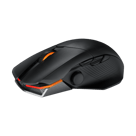


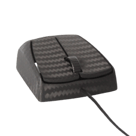
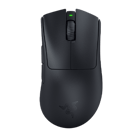

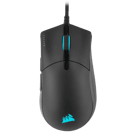


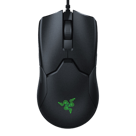
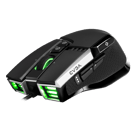




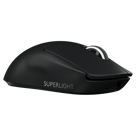

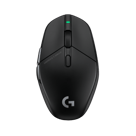

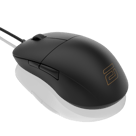
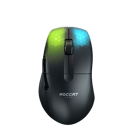

Thanks this was helpful (-v-)